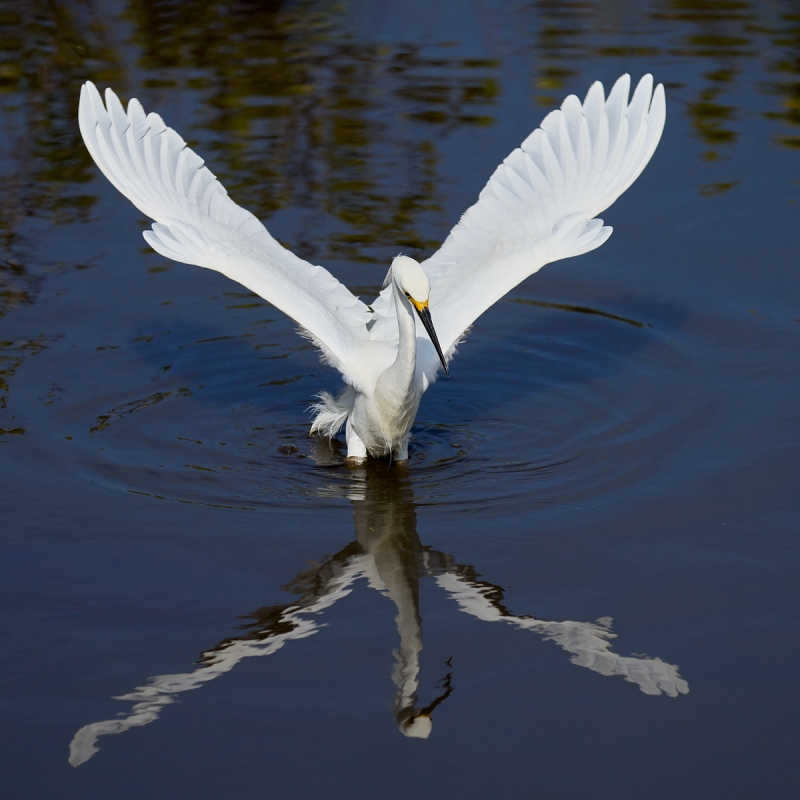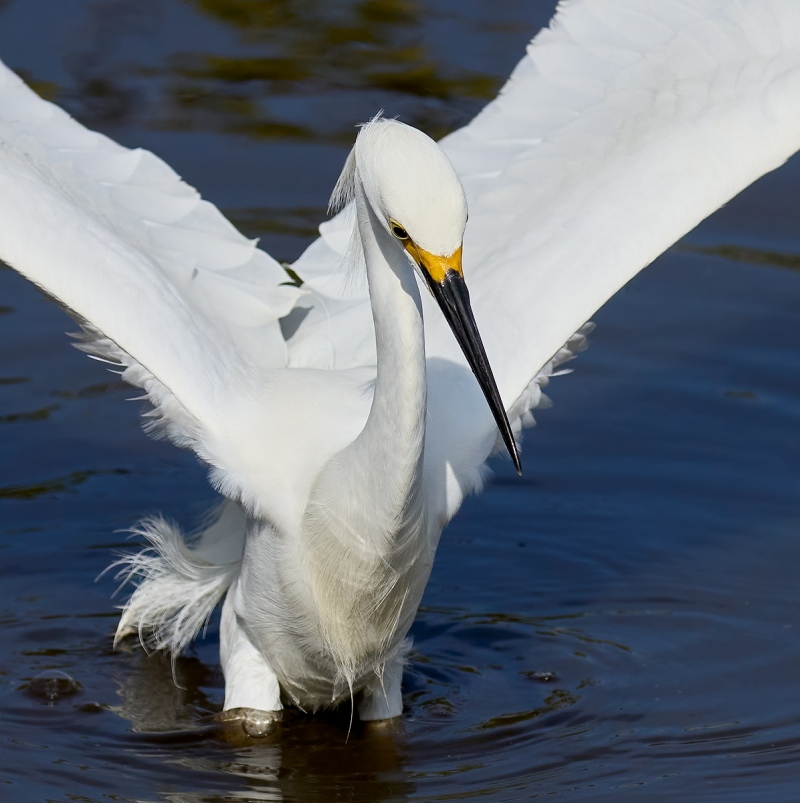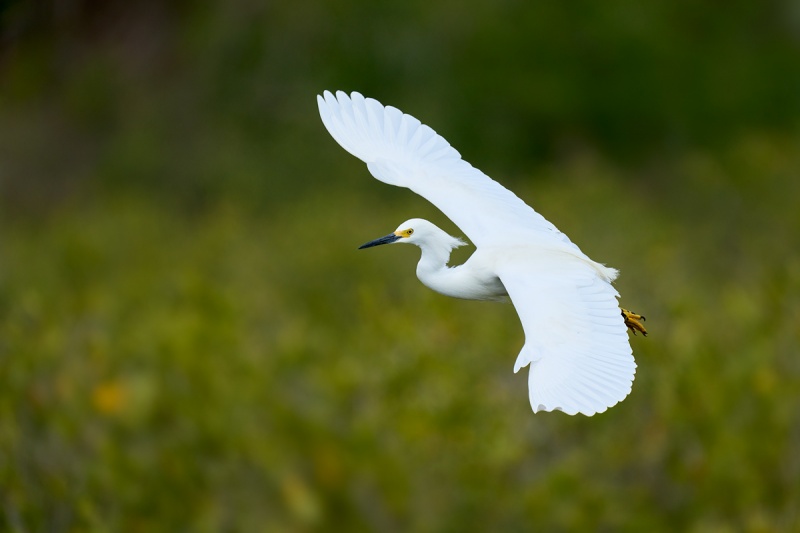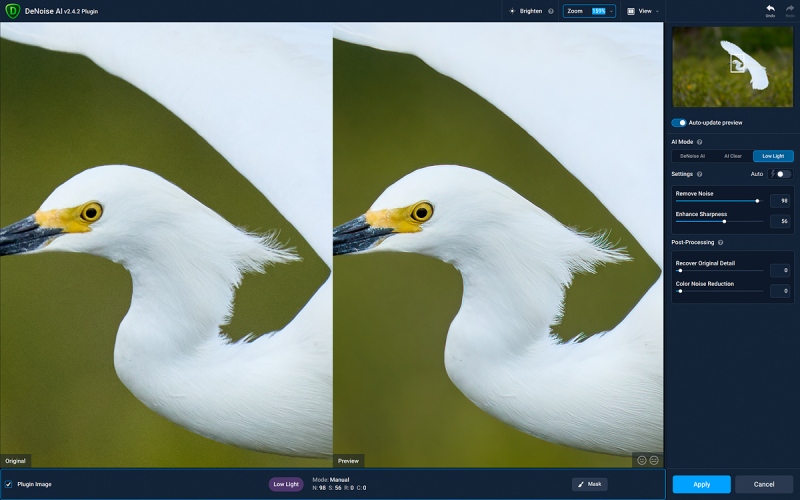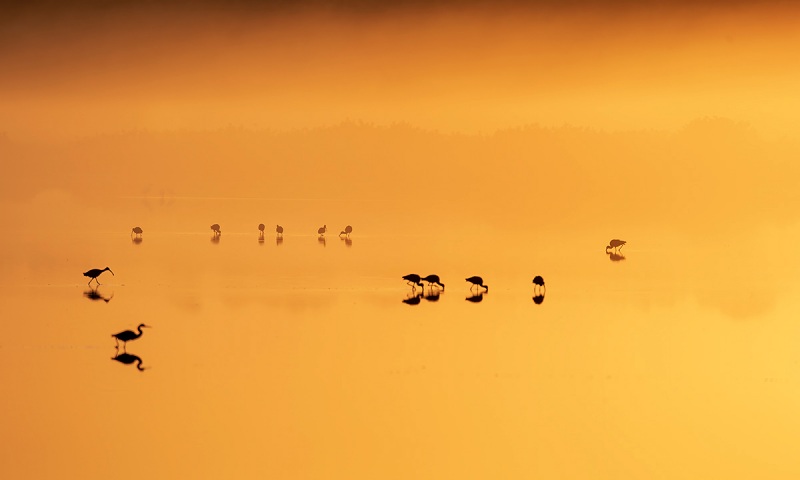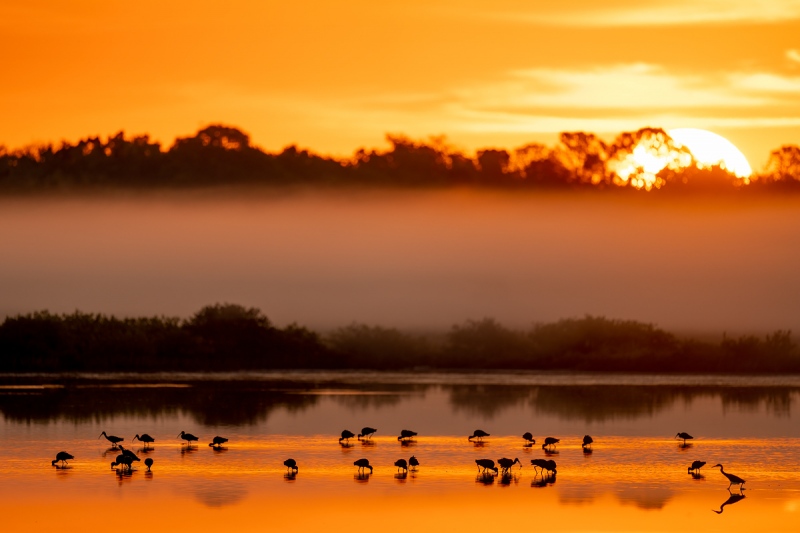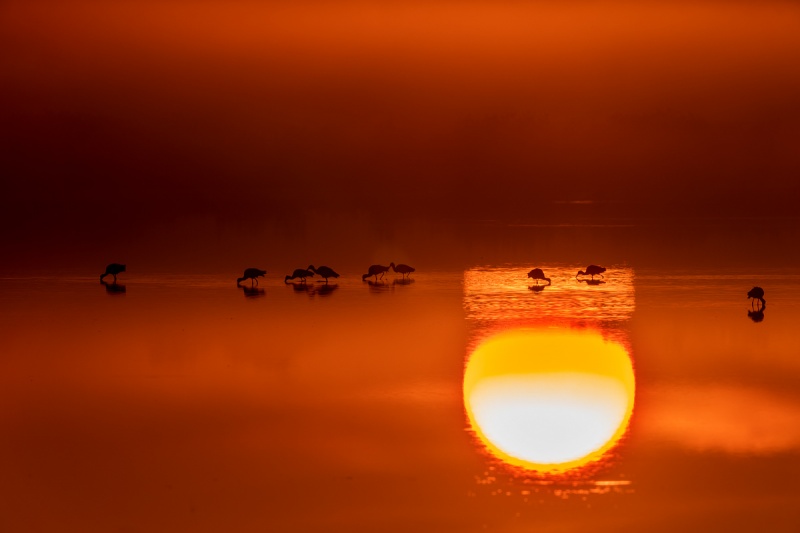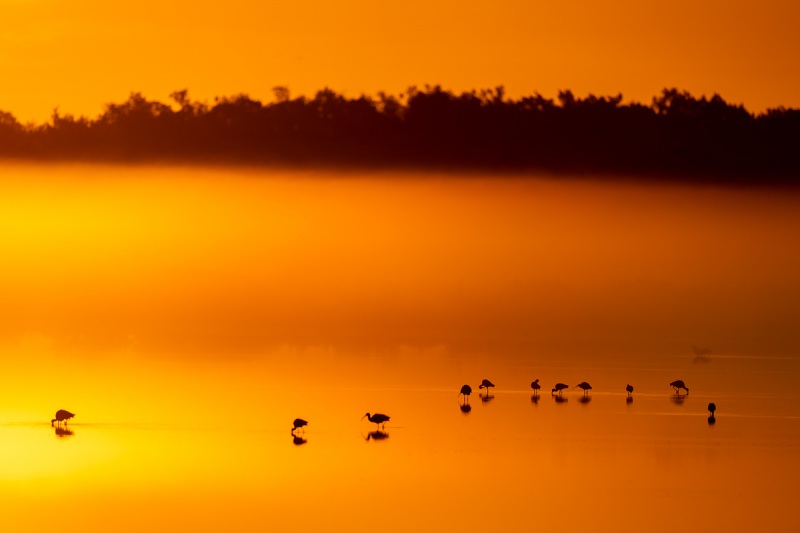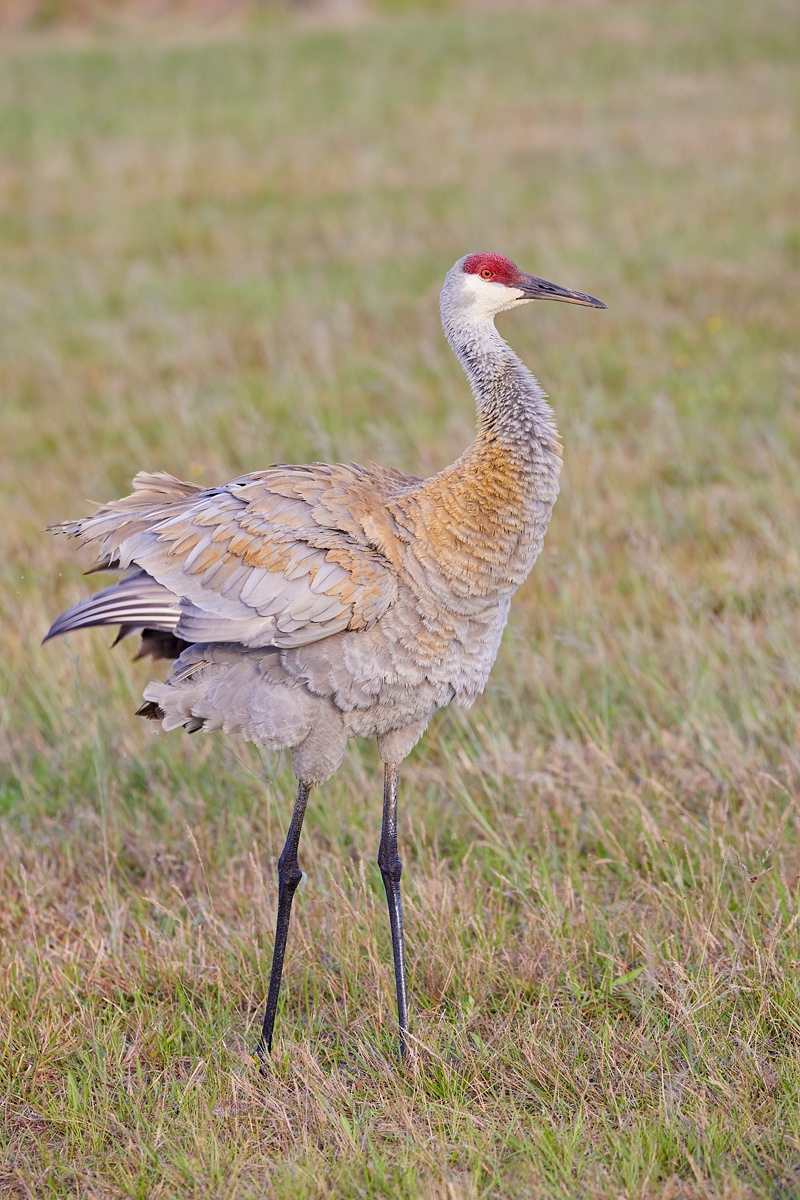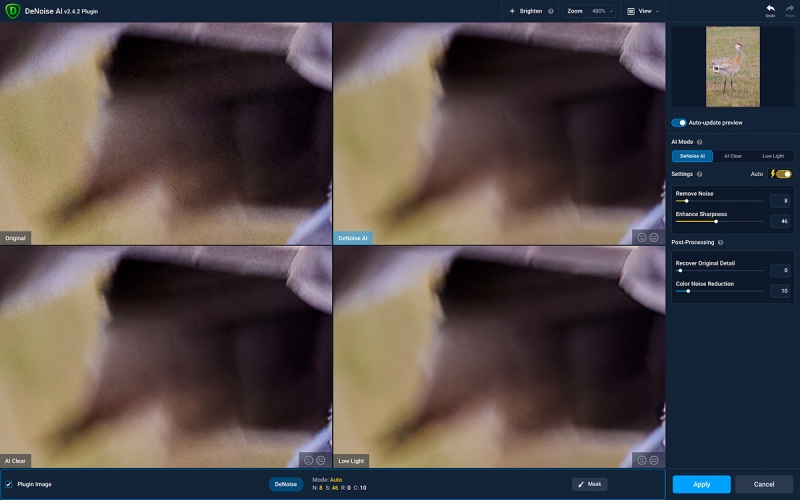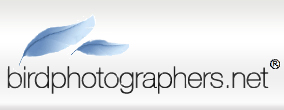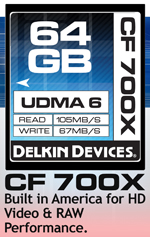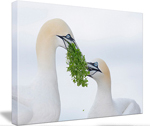What’s Up?
We enjoyed a third straight pretty-decent sunrise on Tuesday. The star of the show was a dancing Reddish Egret in silhouette. Again, we were headed home early only to be surprised by another roadside feeding spree. We had a tasty and too-filling brunch at the dependably good Village Inn.
The afternoon was somewhat of a bust. We worked on group shots of small floating flocks of sleeping Blue-winged Teal. On the way to a good sunset spot, we came across a single sleeping Roseate Spoonbill with a nice reflection. Soon after that, the second straight sunset was fizzled by a distant fog bank.
Today is Wednesday 17 March 2021. We are all dressed in green and headed for Stick Marsh for some Roseate Spoonbill flight photography. The forecast is for clear skies with zero wind picking up a bit to south at 5-10. Again, on a very busy day, I did not have a single moment to devote to the R5 Guide yesterday.
Wherever you are and whatever you are doing, I hope that you have a great day.
This blog post took about 1 1/2 hours to prepare and makes eighty-five days in a row with a new one. Please remember to use my B&H affiliate links or to save money at Bedfords by using the BIRDSASART discount code at checkout.
New and Better Bedfords Discount Policy!
You can now save 3% on all of your Bedfords photo gear purchases by entering the BIRDSASART coupon code at checkout. Your discount will be applied to your pre-tax total. In addition, by using the code you will get 2nd day air shipping via Fed Ex.
Grab a Nikon AF-S Teleconverter TC-14E III and save $14.99. Purchase a Canon EOS R5 and your discount will be $116.97. Purchase a Sony FE 600mm f/4 GM OSS lens and save a remarkable $389.94! Your Bedford’s purchase no longer needs to be greater than $1,000.00 for you to receive a discount. The more you spend, the more you save.
Money Saving Reminder
Many have learned that if you need a hot photo item that is out of stock at B&H and would enjoy free second-day air shipping, your best bet is to click here, place an order with Bedfords, and enter the coupon code BIRDSASART at checkout. If an item is out of stock, contact Steve Elkins via e-mail or on his cell phone at (479) 381-2592 (Central time). Be sure to mention the BIRDSASART coupon code and use it for your online order to save 3% and enjoy free 2nd-day air shipping. Steve has been great at getting folks the hot items that are out of stock at B&H and everywhere else. The wait lists at the big stores can be a year or longer for the hard to get items. Steve will surely get you your gear long before that. For the past year, he has been helping BAA Blog folks get their hands on items like the SONY a9 ii, the SONY 200-600 G OSS lens, the Canon EOS R5, the Canon RF 100-500mm lens, and the Nikon 500mm PF. Steve is personable, helpful, and eager to please.


Gear Questions and Advice
Too many folks attending BAA IPTs (remember those?) and dozens of photographers whom I see in the field and on BPN, are–out of ignorance–using the wrong gear especially when it comes to tripods and more especially, tripod heads… Please know that I am always glad to answer your gear questions via e-mail. Those questions might deal with systems, camera bodies, accessories, and/or lens choices and decisions.
|
|
|
This image was created on 15 March 2021 on the Merritt Island IPT. I used the handheld Sony FE 200-600mm f/5.6-6.3 G OSS lens (at 250mm) and The One, the Sony Alpha 1 Mirrorless digital camera. ISO 400. Exposure determined via Zebras with ISO on the Thumb Dial: 1/3200 sec. at f/6.3 (wide open). AWB at 9:42am on a clear morning. Wide/AF-C was active at the moment of exposure and performed perfectly. Click on the image to see a slightly larger version. Image #1: Snowy Egret dip-landing |
What is a Dip-landing?
Snowy Egrets often engage in dip-feeding: they take flight over a small pool or pond, and grab usually tiny baitfish while airborne. The bird in Image #1 was dip-feeding when it realized that the water was deep enough for it to land in. Thus, a dip-landing 🙂
As I mentioned yesterday, the huge problem with the situation was isolating a single bird in a frame without other birds or their distracting white reflections. The square crop here with a bit of canvas added above completed the isolation trick. The funny thing is that I kept suggesting to the group that the best plan of action was to zoom out to 250mm and fire away. Following my own advice here worked to perfection.
|
|
Image #1A: 100% Screen Capture of the Snowy Egret dip-landing image |
Amazing Sony Alpha a1 AF
I continue to be astounded by the speed and accuracy of the SONY autofocus system. With the addition of the bird autofocus options, the AF system is clearly better than the AF systems of the a9 ii and the Canon R5. You can learn exactly how I set up my a1 by joining the SONY Alpha a1 Set-up and Info Group.
SONY Alpha a1 Set-up and Info Group
The SONY Alpha a1 Set-up and Info Group is going great guns as folks chime in with thoughtful questions and experience-based answers. I learned a ton yesterday in exchanges with Craig Elson and James Spillman. Like the R5, the a1 is an incredibly complex camera body.
All who purchased their Alpha a1 bodies via a BAA affiliate link receive a free subscription to the Sony Alpha a1 Set-Up and Info Updates. This same service may be purchased by anyone with an a1 body via a $150.00 Paypal sent to birdsasart@verizon.net indicating payment for Alpha a1 Info Updates. New members will receive all back issues.
|
|
|
This image was created on 15 March 2021 on the Merritt Island IPT. I used the handheld Sony FE 200-600mm f/5.6-6.3 G OSS lens (at 600mm) and The One, the Sony Alpha 1 Mirrorless digital camera. ISO 400. Exposure determined via Zebras with ISO on the Thumb Dial: 1/3200 sec. at f/6.3 (wide open). AWB at 10:02am on a then cloudy morning. Wide/AF-C was active at the moment of exposure and performed perfectly. Click on the image to enjoy a larger version. Image #2: Snowy Egret perfect flight shot? |
Snowy Egret Perfect Flight Shot?
Is this a perfect flight image? Why or why not? Is there anything missing that might have improved it?
Photographing in Rapidly Changing Light
If the light is constant, such as it is on a totally cloudy day or a clear sunny morning, getting the right exposure with any camera system is relatively easy (if and only if you know what you are doing). But when light clouds drift in front of the sun briefly photographers are really put to the test: bright sun one moment and white sky conditions the next. With lots of in-between possibilities. Though I find that it is easier to get it right with SONY’s Zebra technology with ISO on the rear dial, it still ain’t easy. Not to mention that you always want to guard against totally blowing the whites and having to delete the image.
Out late-in-the morning session on Monday was typically difficult. Getting close to the right exposure often meant 4-5 one-third-stop clicks to get things close to right. Image #1 was about 1/2 stop under, Image #2 was less than 1/3-stop too dark. All in all, not bad. And all with zero over-exposed highlight.
As always, folks are referred to the section on Exposure Theory in the original soft-cover The Art of Bird Photography.
|
|
Image #2A: Topaz DeNoise AI on the Snowy Egret perfect flight shot? image |
Topaz DeNoise AI
Click on the image to see how beautifully Topaz DeNoise AI on Auto cleaned up the background noise and sharpened an already sharp image beautifully and non-destructively.
Great Topaz News!
Folks who use the BAA Topaz link to purchase Sharpen AI, DeNoise AI, or the Utility Bundle (or any other Topaz plug-ins), will receive a 15% discount by entering the ARTHUR15 code at checkout. If the stuff is on sale (as it usually is), you save 15% off of the sale price! To get the discount you must use my link and you must enter the discount code. Be sure to start with this link.
Those who purchase Sharpen AI, DeNoise AI, or any other Topaz plug-ins using my link and then entering the ARTHUR15 code at checkout can e-mail to request a short Getting Started with Topaz e-Guide. Please include a copy of your Topaz receipt that shows the discount. Aside from the basics, the guide explains how to install the plug-ins so that they appear in the Photoshop Filter Menu.
Typos
With all blog posts, feel free to e-mail or to leave a comment regarding any typos or errors.


